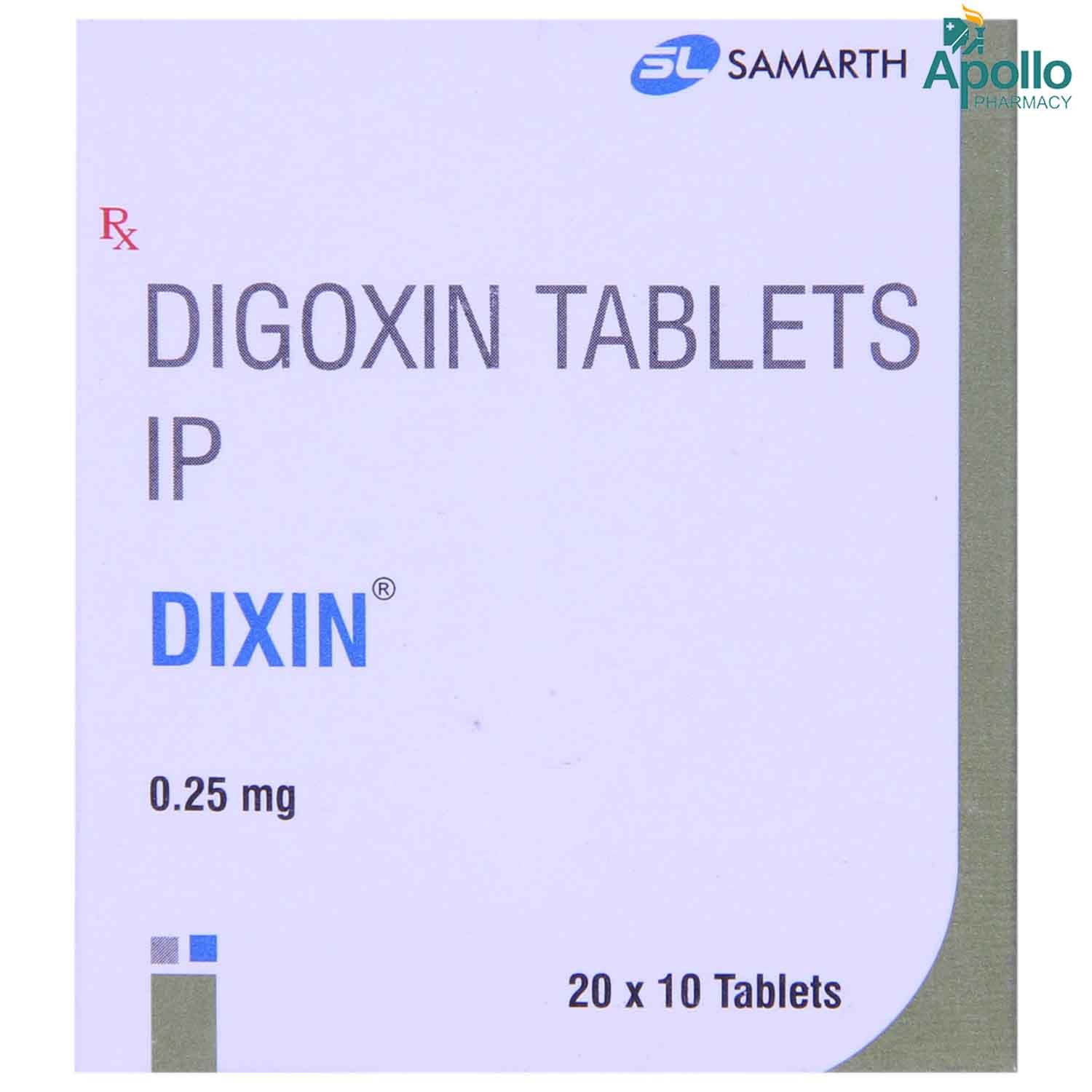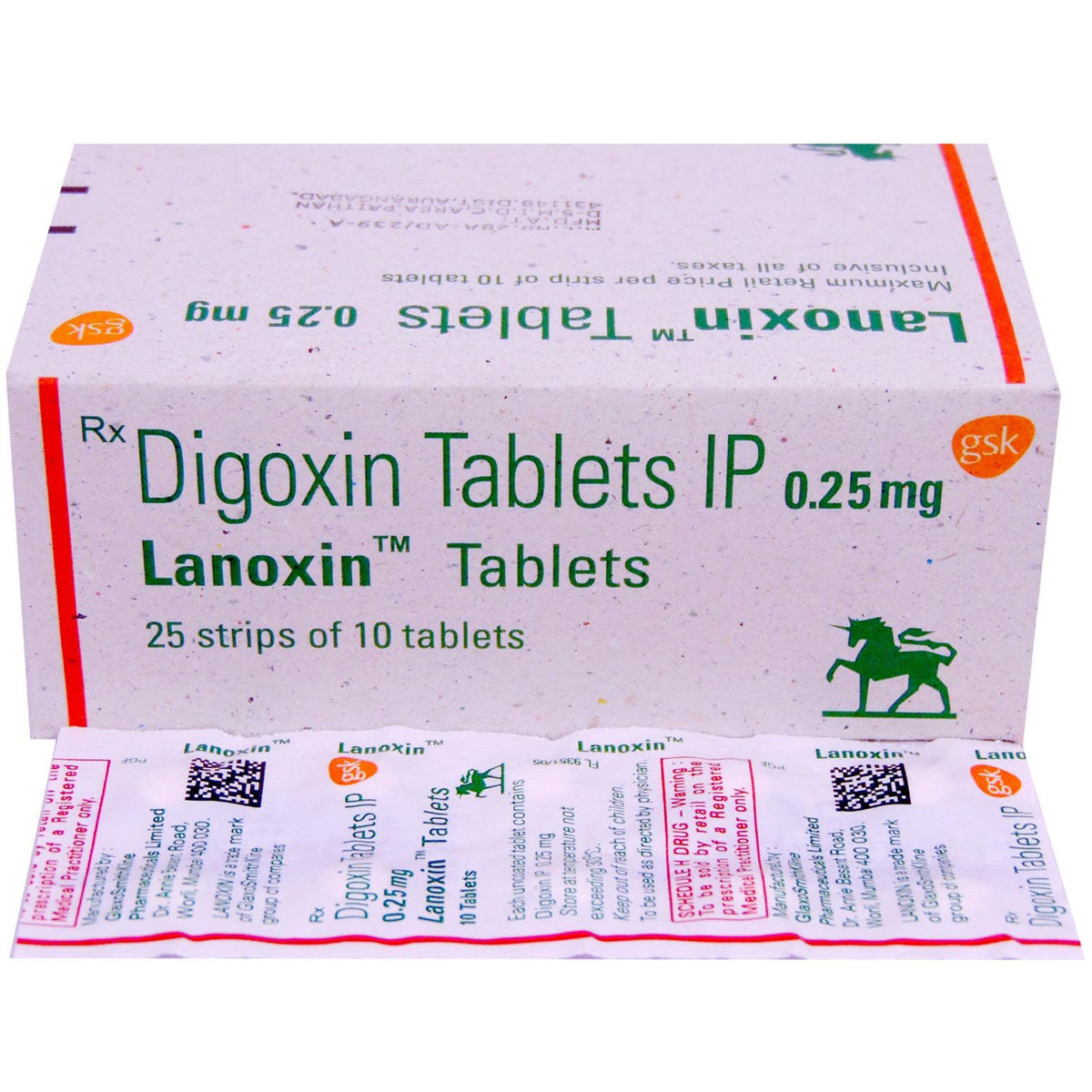Digover Tablet 10's
MRP ₹14.5
(Inclusive of all Taxes)
₹2.2 Cashback (15%)
Provide Delivery Location
Online payment accepted
 Prescription drug
Prescription drugWhats That
Composition :
Manufacturer/Marketer :
Consume Type :
Return Policy :
About Digover Tablet 10's
Digover Tablet 10's belongs to a group of medicines called cardiac glycosides used to treat irregular heartbeats and manage the symptoms of heart failure. Heart failure is a chronic condition in which the heart is unable to pump blood as effectively as it should. Irregular heartbeat is a condition in which your heart beats irregularly, too fast or too slow.
Digover Tablet 10's contains digoxin, i.e. cardiac glycosides that help to increase the output force of the heart and reduces the rate of heart contractions. Digover Tablet 10's works on the heart muscle directly and increases the force with which heart muscle contracts with each heartbeat. Thereby, it makes heart efficient in pumping blood around the body and slows down the rate at which heartbeats.
Take Digover Tablet 10's as prescribed. Your doctor will recommend you how often you take Digover Tablet 10's based on your medical condition. Some people may experience common side effects like diarrhoea, nausea, vomiting, dizziness, abnormal heartbeat or skin rash. Most of these side effects of Digover Tablet 10's do not require medical attention and gradually resolve over time. However, if the side effects persist, please consult your doctor.
If you are known to be allergic to Digover Tablet 10's or any other medicines, please tell your doctor. Pregnant or breastfeeding women are advised to consult a doctor before taking the tablet. Regular blood tests are recommended by your doctor while taking Digover Tablet 10's to monitor the amount of Digover Tablet 10's in the bloodstream as its toxicity can lead to several forms of heart rhythm disturbances, vomiting, nausea and visual disturbances. If you have beriberi disease caused due to vitamin B1 deficiency, malabsorption syndrome (unable to absorb minerals from food) or any lung or kidney disease, please inform your doctor before taking Digover Tablet 10's so that the dose may be adjusted or an alternate medicine may be prescribed accordingly. Digover Tablet 10's has a very narrow therapeutic index. It means small differences in dose of drugs in the body may lead to life-threatening conditions or serious side effects. This makes its use limited and requires close monitoring by doctors like regular electrocardiogram (ECG). So, try not to self-medicate and suggest Digover Tablet 10's to others.
Uses of Digover Tablet 10's
Directions for Use
Key Benefits
Digover Tablet 10's is a cardiac glycoside that is used to treat heart failure and irregular heartbeats. Digover Tablet 10's increases the force with which heart muscle contracts with each heartbeat and makes heart efficient in pumping blood around the body. Thus, slows down the rate at which heartbeats and makes heart rate normal. Digover Tablet 10's improves heart failure symptoms such as exercise capacity and reduces the number of hospitalizations.
Storage
Drug Warnings
If you are known to be allergic to Digover Tablet 10's or any other medicines, please tell your doctor. Pregnant or breastfeeding women are advised to consult a doctor before taking the tablet. Avoid intake of alcohol with Digover Tablet 10's as it may increase the risk of drowsiness. Digover Tablet 10's may cause vision problems in some people. Make sure you are not affected before driving. Regular blood tests are recommended by your doctor while taking Digover Tablet 10's to monitor the amount of digoxin in blood as digoxin toxicity can lead to several forms of heart rhythm disturbances, vomiting, nausea and visual disturbances. If you have beriberi disease caused by vitamin B1 deficiency, malabsorption syndrome (unable to absorb minerals from food), thyroid, or any lung or kidney disease, please inform your doctor before taking Digover Tablet 10's so that the dose may be adjusted or an alternate medicine may be prescribed accordingly. Digover Tablet 10's has a narrow therapeutic index which makes its use limited and requires close monitoring as small change in dose or blood concentration may lead to severe adverse effects, and overdose may lead to life-threatening reactions.
Diet & Lifestyle Advise
- Maintain a low salt diet and minimize eating processed foods as they contain more sodium. Try to replace salt with spices or herbs to add flavour to the food.
- Do the regular exercise as it helps to lower blood pressure and keeps blood vessels and heart in good condition.
- Quit smoking as smoking increases blood pressure and heart rate.
- Eat balanced and healthy diet which includes plenty of vegetables, fruits, low fat or fat free products.
Side Effects of Digover Tablet 10's
- Feeling confused
- Dizziness
- Nausea or vomiting
- Loss of appetite
- Diarrhoea
- Changes in your vision (including blurred vision and not able to look at bright light)
Habit Forming
Therapeutic Class
All Substitutes & Brand Comparisons
RX
Out of StockDigitran 0.25mg Tablet
Macleods Pharmaceuticals Ltd
₹5.89
(₹0.53 per unit)
63% CHEAPERRX
Out of StockGeoxin 0.25mg Tablet
₹10
(₹0.9 per unit)
37% CHEAPERRX
Out of StockCanrythm 0.25mg Tablet
₹11.8
(₹1.06 per unit)
26% CHEAPER
Author Details
We provide you with authentic, trustworthy and relevant information
FAQs
Drug-Drug Interactions Checker List
- AMIODARONE
- QUINIDINE
- ATAZANAVIR
- SAQUINAVIR
- CLARITHROMYCIN
- ITRACONAZOLE
- ADENOSINE
- DOLASETRON
- ARBUTAMINE
- CERITINIB
- LAPATINIB
- FINGOLIMOD
- FLIBANSERIN
- CALCIUM CHLORIDE
- CALCIUM GLUCEPTATE
- CALCIUM GLUCONATE
Special Advise
- Regular blood tests are advised while taking Digover Tablet 10's to monitor digoxin levels in the blood, potassium levels and kidney functioning.
- Low salt diet and regular exercise are recommended along with Digover Tablet 10's for effective results.
- Regular electrocardiogram (ECG) should be done to see the effect of Digover Tablet 10's on your heartbeat.
Disease/Condition Glossary
Heart failure: It is a chronic condition in which the heart is unable to pump blood as effectively as it should. Heart failure may occur due to certain conditions like high blood pressure, swelling or damage of heart muscle, faulty heart valves or narrow arteries in the heart. Symptoms of heart failure include shortness of breath, tiredness, fast heartbeat and swollen legs.
Arrhythmia (irregular heartbeat) is a condition in which your heart beats irregularly, too fast or too slow. Symptoms of irregular heartbeat include chest pain, shortness of breath, fast or slow heartbeat. 60 to 100 beats per minute is generally considered as normal heart rate.

Have a query?
Alcohol
Safe if prescribed
You are recommended to avoid consumption of alcohol with Digover Tablet 10's as it may increase drowsiness and reduce the amount of Digover Tablet 10's in blood leading to abnormal heart function.
Pregnancy
Consult your doctor
Tablet: It is a Category C pregnancy drug and is to be given to pregnant women only if it is clearly needed and prescribed by a doctor.
Breast Feeding
Consult your doctor
Tablet: It is safe for breastfeeding mothers if prescribed by a doctor.
Driving
Safe if prescribed
Digover Tablet 10's may cause dizziness, yellow or blurred vision in some people. So, make sure you are not affected before driving or operating machinery.
Liver
Consult your doctor
If you have any concerns regarding the use of Digover Tablet 10's in patients with Liver problems, please consult a doctor.
Kidney
Consult your doctor
Take Digover Tablet 10's with caution, especially if you have a history of Kidney diseases/conditions. The dose may be adjusted by your doctor as required.
Children
Safe if prescribed
Paediatric solution is to be used in children in doses as prescribed by a child specialist.










